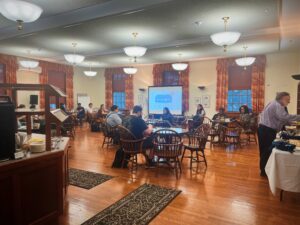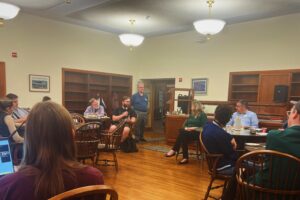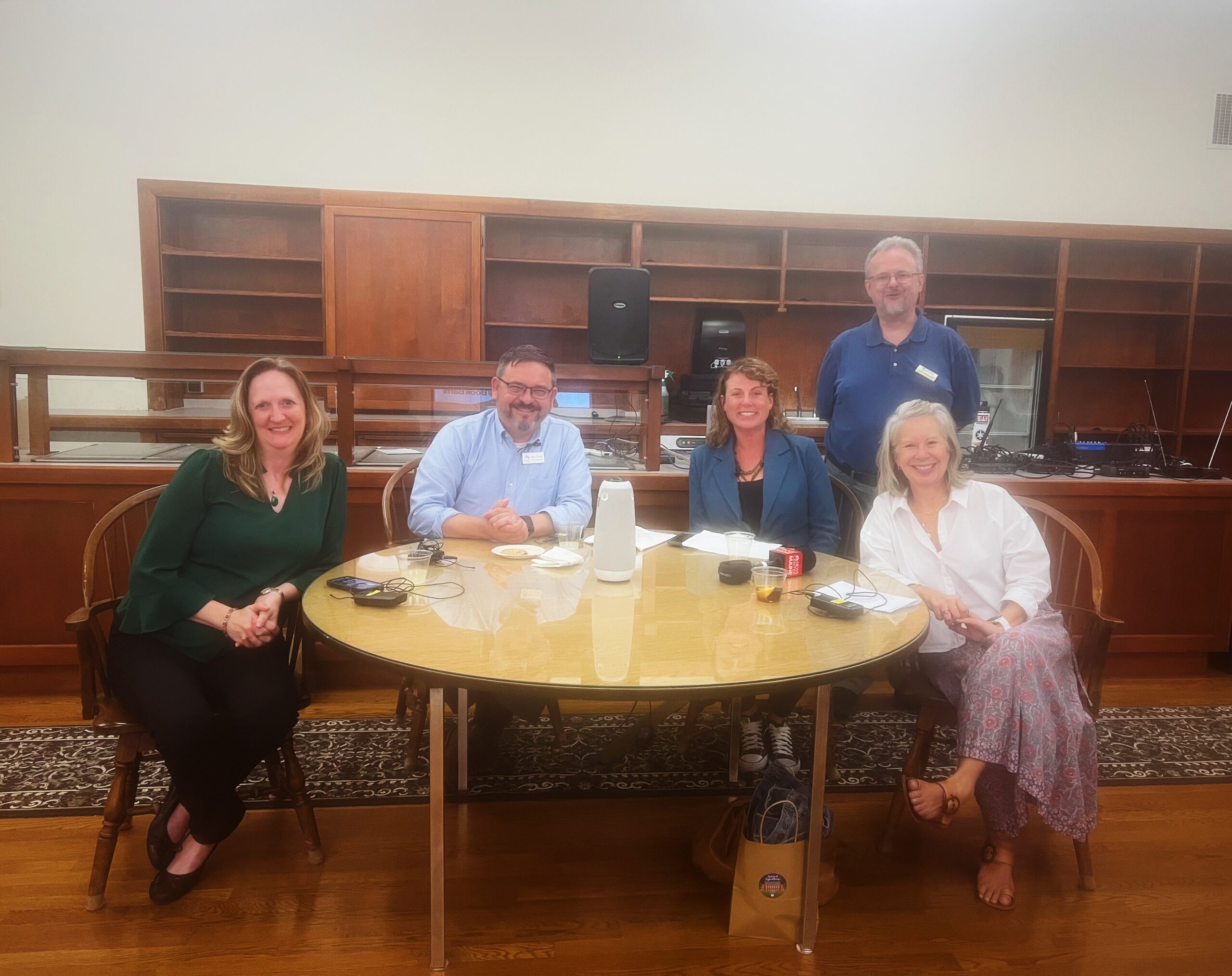Fogler Library held an interactive workshop on Oct. 3 to inform participants of how censorship poses a serious threat to librarians and their pursuit of encouraging versatile knowledge in society. Furthermore, they discussed how the unnecessary banning of books has negatively impacted schools, public/private libraries and other learning environments across the globe.
This hybrid event was part of the Salon Series and co-sponsored by Fogler Donors and the Honors College. In recognition of Banned Books Week, Fogler Library welcomed five panelists, each involved with separate public, school and state libraries in Maine.
Nory Fisher served as a moderator and also as one of the guest speakers. She made it apparent that though book-challenging is not a new action, there has been a significant uptick concerning formal complaints filed in the U.S. between 2019, with 377 challenges, and current-day. In 2020, that statistic went down to 156 but was up to 729 in 2021. In 2022, it doubled to a jarring 1,597 formal challenges and has increased by 20% throughout the first eight months of 2023. 49% of these challenges were issued against public library material rather than in schools.
Maine Association of School Libraries VP Beth Anderson shared that between January 2022 and August 2023, there were 22 formal book challenges against schools in Maine. Most years, there were none. However, two have already been submitted within the first month of this academic year. Anderson drew an important distinction between the preceding process in response to formal challenges and informal complaints, which occur far more frequently.
When a formal book challenge is issued, as in when paperwork has been filed with a school district, a review committee is formed in turn. Members of that committee then will read the book in its entirety and discuss its merit in consideration of other professional reviews. Once their determination is made, it is passed to the school board, which also takes a formal process and passes a final decision.
Informal complaints tend to go completely off the rails when brought up at school board meetings. It frequently evokes a hostile environment of name-calling and other unnecessary aggression toward administrators. The same goes for the form of phone calls or emails received by teachers and librarians. It even goes as far as in-person approaching and confrontational behavior. Harassment in these forms and others takes a vast emotional toll on staff members and should not be taken lightly.
“This all has created an atmosphere where school librarians and other educators are very frustrated and discouraged. Some Librarians feel unsafe going to work. For example, we’ve had school librarians ask for an escort to their cars in the afternoon because they’ve been confronted in parking lots by parents,” Anderson said. “A lot of us work in the communities in which we live, and we have had colleagues who’ve been approached in the grocery store. Again, being constantly harassed about why these books remain on the shelves.”

Fisher delved into three separate bills in Maine that were recently put in front of the Education and Cultural Affairs Committee. One of which is LD123, which states that “ the educational purposes exception to the prohibition of the dissemination of obscene material to minors must be eliminated.” In summation, it suggests that school librarians and teachers should be criminally charged for not abiding by that law. It was voted not to pass, though a minority voted to favor its establishment.
Another was LD618, which intended to “eliminate critical race theory, social and emotional learning and diversity, equity and inclusion from school curriculum.” It also did not pass.
Lastly was LD1008, set to establish a rating system for books in school libraries. The reason its passing would be harmful is that it requires an imposition of individual views that may deter people from reading material. This would go against the Library Bill of Rights, and therefore, it did not pass thanks to the efforts and advocacy of Maine Library Association and Maine Association of School Libraries.
“There are a lot of different ways that censorship is happening right now. I am hearing from a lot of libraries that they have displays, especially the ones that were up during pride month, where a patron would come in and check out every single book on the display and turn to the library staff to say, ‘I am checking these out and I am never going to return them because I don’t want anybody to read them,” Fisher said.
There are implemented circulation policies. Typically, the individual will receive a warning, followed by a suspension from the library and then a subsequential fine delivered through the mail. These policies do take time and are not possible when people take the route of hiding books around the library as a means of preventing public access. Much of the information found in libraries can potentially improve one’s quality of life, free of charge.
“One of the biggest things you can do as community members if you support the freedom to read, if you support the Library Bills of Rights, go in and talk to your librarians. Tell them you appreciate what they do, tell them you support their efforts to ensure all materials for all people in the community are available,” said Fisher.
Bangor Public Library (BPL) Director Ben Treat noted the primary issues in regard to this topic, which were three-fold. He shared perturbations with book banning in academic settings. Doing so serves as a removal of certain representations and has the potential to blur the realities of the world. It could also create preconceived notions that libraries, in general, lack materials for persons of marginalized backgrounds.
Secondly, it goes beyond the rhetoric of reporting inappropriate content in an effort to protect children to the point where the entire population is sheltered from the work in question. Thirdly, he drew attention to sites such as BookLooks, where various individuals share their book-related grievances. Oftentimes, in doing so, content is taken out of context, and the book is considered exceedingly obscene based on singular excerpts rather than the work as a whole and its overall message.
One common misconception is that work centered around a protagonist identifying as a POC is automatically under the umbrella of critical race theory, which centers around the ideology that there is no middle ground between being an oppressor or among the oppressed.
“People aren’t really sure what they mean by critical race theory, but they want to ban a book because there’s a black character, so they think it must be critical race theory. I am not saying you should ban a book because it has critical race theory, but this whole project is based on deep misunderstandings of how we should really look at books and think about collection development and building a collection that represents the population we serve,” said Treat.

Maine State Librarian Sonya Durney provided another important perspective. Though she has not seen censorship attempts against the academic libraries in Maine, it has grown exceedingly prominent within the higher education sphere. For example, 300 gag order bills have been pushed to pass in the state since 2021.
“Faculty are afraid to speak freely in the classroom, worrying that they will get in trouble for breaking these gag orders or saying the wrong things. So it’s really having a chilling effect on open inquiry in the classroom… The other piece is students are also self-censoring themselves because of the political climates on campus,” Durney said.
She states that staff is busier than ever, specifically due to a devotion time towards fighting these gag orders and book bannings. Having been on the board for seven years, Durney has never seen such a necessity for said efforts. It forsakes the time typically utilized to support library faculty and empower librarians positively.
There are a multitude of personal actions capable of fighting censorship and contributing to the cause. One of which is to be aware of the procedures within your governing body before an issue arises. Examples of such are as follows: knowing where and when each meeting takes place, at which point public comments occur and how long each person is given to speak. It is very important to prepare your piece per your town’s limitations.
Another beneficial action is to join Unite Against Book Bans. The site provides important news happenings and allows you to stay updated on current events related to the cause. According to Treat, if you support the fight, read banned books, be seen reading them, and be sure to share your thoughts with those around you, specifically about material that is most heavily or constantly being threatened. Emphasize the importance of its role in society! Most imperatively, it is to show appreciation to your local librarians and express gratitude for their never-ending battle whenever possible. They need our support now more than ever.
“They know how to select materials for their community, and they do it well. To have that totally dismissed and put aside, that certain people can say ‘nobody should read this,’ it’s really a slap in the face, and nobody needs that,” said Fisher.
The Salon Series Censorship event then held a Q-and-A portion for attendees, followed by a small group discussion. It concluded with a reconvening at the end. Remember to show support at the school board meetings near you!








